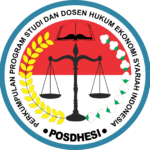THE CONCEPT OF TAX IN THE PERSPECTIVE OF ABU UBAID
A Relevance With The Tax System In Indonesia
DOI:
https://doi.org/10.22373/iqtishadiah.v4i1.3003Keywords:
Tax Collection, Ubaid’s Concepts, Indonesian Tax Policies, Islamic EconomicsAbstract
This article examined if the implementation of tax policies in Indonesia adopts the Islamic concepts or not. In doing so, the article refers to Ubaid’s concepts on tax collection as advocated in the Islamic community. The main concern of the article was at exploring realities and practices during the implementation of tax policies to the Indonesian citizens, which in turns affecting the Muslim societies as well. This inquiry was explored usingqualitative method, in which the socio-economics approach was used as the basis of analysis. The data was collected using interviews of reputable figures in the field of Islamic economics and tax policies. The research findings disclosed that the Indonesian tax policies have partially adopted the Ubaid’s concepts on tax collection. In term of legal sources, the Indonesian tax policies have fully referred to the Indonesian tax law, and few of them have similarities with Ubaid’s concepts of the tax collection.
References
Karim, Adiwarman A. Sejarah Pemikiran Ekonomi Islam, Indonesia: IIIT, 2002.
Gusfahmi, Pajak Menurut Syariah, Jakarta: PT Raja Grafindo Persada, 2007.
Karim, Adiwarman Azwar, Sejarah Pemikiran Ekonomi Islam, ed.2, Jakarta: Raja Grafindo, 2004.
Karim, Adiwarman Azwar, Sejarah Pemikiran Ekonomi Islam, ed.3, cet.4, Jakarta: Rajawali Press, 2010.
Nurul Huda, dan Ahmad Muti, Keuangan Publik Islam; Pendekatan Al-Kharaj; Imam Abu Yusuf, Bogor: Ghalia Indonesia, 2011.
Chaudhry, Muhammad Sharif, Sistem Ekonomi Islam: Prinsip Dasar (Fundamental of Islamic System), terj. Suherman Rosydi, cet.3, Jakarta: KENCANA, 2016.
Karim, Adiwarman Azwar, Ekonomi Makro Islami, ed.3, cet.8, Jakarta: Rajawali Pers, 2015.
Rozalinda, Ekonomi Islam; Teori dan Aplikasinya pada Aktivitas Ekonomi, ed.1, cet.3, Jakarta: Rajawali Pers, 2016.
Huda, Nurul, dan Hardius Usman, Teori dan Aplikasi Statistik; Pendekeatan Analisis Ekonomi Islam, Jakarta: Kencana, 2016.
Jaribah bin Ahmad Al-Haritsi, Fikih Ekonomi Umar bin Al-Khathab, terj. Asmuni Solihah Zamakhsyari, Jakarta: Pustaka Al-Kautsar, 2006.
Ismail, Abdul Ghafar, and Jaafar, Abu Bakar, “Government Revenue In The Eyes Of Abu Ubaid; An Analysis”. International Journal of Asian Social Science, (2015, 5(1), pp. 1-17) https://www.jstor.org/(diakses 20/11/2017).
Shihab, M. Quraish, Tafsir Al-Mishbah; Pesan, Kesan, dan Keserasian al-Qur’an, cet.2, Jakarta: Lentera Hati, 2004.
Al-Kufiy, Abu Yusuf Ya’qub bin Ibrahim, Al-Kharaj, Libanon: Daarul Ma’rifah, 1979.
Chapra, M. Umer, Reformasi Ekonomi: Sebuah Solusi Perspektif Islam, terj. Ikhwan Abidin Basri, Jakarta: Bumi Aksara, 2008.
Gusfahmi, http://www.pajak.go.id/content/article/pajak-haramkah, 2016, (diakses 27/1/2018).
https://www.kemenkeu.go.id/informasi-publik/realisasi-apbn/(diakses 03/02/2018).
UU Cukai UU 11/1995 dan UU 39/2007.
UU Kepabeanan UU 10/1995 dan UU 17/2006.
UU No.11 Tahun 2016 Tentan Pemerintahan Aceh










